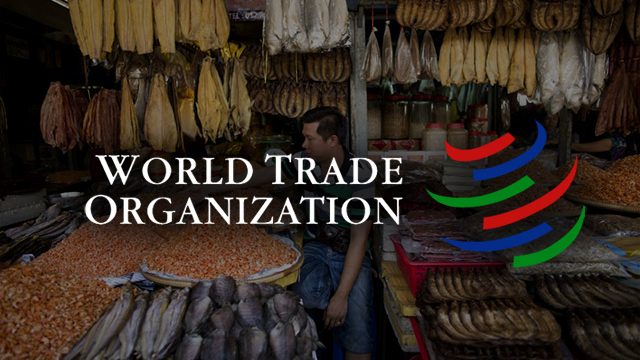SUMMARY
This is AI generated summarization, which may have errors. For context, always refer to the full article.

MANILA, Philippines – The Philippines has formalized its advocacy to make micro, small, and medium-sized enterprises (MSMEs) part of the global trade agenda, leading to its adoption by the World Trade Organization (WTO).
The Philippine Mission to the WTO (PMWTO) in Geneva has submitted two documents on “Fostering the Participation of MSMEs in Regional and Global Markets,” the Department of Trade and Industry (DTI) announced on its website on Monday, October 5.
The PMWTO said the first submission in July provided the rationale for starting a conversation that includes MSMEs. It also highlighted the opportunities to further strengthen linkages within the WTO. It also covered push for discussions on existing linkages with other international organizations, such as the United Nations Conference on Trade and Development, the World Bank Group, and the International Trade Centre.
The second submission provided a draft ministerial statement for the 10th WTO Ministerial Conference in Nairobi, Kenya, which will be held from December 15 to 18. The conference is held every two years and the Philippines has been an advocate of the MSME sector in these high-level meetings.
The Asia-Pacific Economic Cooperation (APEC), through the Boracay Action Agenda in May, formalized the use of MSMEs from SMEs and thereby indicate the sector’s distinctive situation and full inclusion in its agenda to foster their participation in regional and global markets.
Gregory Domingo, in his remaining months as DTI secretary, earlier said he will continue initiatives in providing broader opportunities for MSMEs in the international market.
Most vulnerable
At the 8th Ministerial Conference in 2011, the Philippines urged WTO to prioritize then SMEs in the ongoing trade talks as they are most vulnerable to market uncertainties.
At the 9th Ministerial Conference, the Philippines negotiated the Bali Package, designed to streamline trade and benefit the Philippines’ SMEs, particularly exporters.
Domingo, who participated in the WTO Public Forum in September this year, said the plenary session on “Making Trade Work for Business” particularly focused on the relationship between trade and business, including MSMEs and agribusiness.
The Philippines also organized a working session on “Fostering the Participation of MSMEs in Regional and Global Markets,” which further provided clarity on how global collaboration, with the WTO at the forefront, would be a critical element in making trade work for all.
Access to financing
Also on Monday, the Senate approved on 3rd and final reading a bill that seeks to provide more access to financing for MSMEs.
Senate Bill 2909, introduced by Senator Paolo Benigno Aquino IV aims to expand and strengthen the current Credit Surety Fund (CSF) program of the Bangko Sentral ng Pilipinas (BSP) by making it easier for MSMEs – including cooperatives and non-government organizations (NGOs), authorized representatives of local government units (LGUs), government financial institutions (GFIs), and other institutional/government agencies – to gain access to credit facilities.
The CSF is created by pooling the contributions of cooperatives and NGOs, LGUs, and partner institutions. It allows MSMEs to borrow from banks using the CSF as security for the loan instead of conventional collateral. Under the BSP’s CSF, cooperatives and NGOs may accept collaterals that are otherwise not acceptable to banks such as stocks in trade, agricultural land, chattel, and vehicles.
“The lack of access to financing remains the biggest roadblock for the growth of MSMEs in the country since the existing requirements for credit do not consider the nature of micro and small businesses,” Aquino, chairman of the committee on trade, commerce, and entrepreneurship, said in a statement released October 5.
The measure would give small enterprises with loan requirements ranging from P500,000 ($10,757.24) to P5 million ($107,573.47) access to loans provided by established banking institutions. Under the measure, the BSP will spearhead the promotion, creation, and organizational development of CSF cooperatives.
It will provide technical assistance, such as training and seminars, as well as assist the Cooperative Development Authority in setting the criteria and qualifications for CSF cooperatives. It will also provide other forms of assistance as determined by the Monetary Board.
Data showed that the BSP has around 40 CSF projects across the country. It also showed that 548 cooperatives are now involved in the project, with over 14,000 Filipinos benefitting from the program.
“The challenge now is to how to help our countrymen grow their micro businesses into small enterprises, and the enterprises, to medium enterprises,” Aquino said. – Rappler.com
US$1 = P46.48 Seller image from Shutterstock
Add a comment
How does this make you feel?





There are no comments yet. Add your comment to start the conversation.